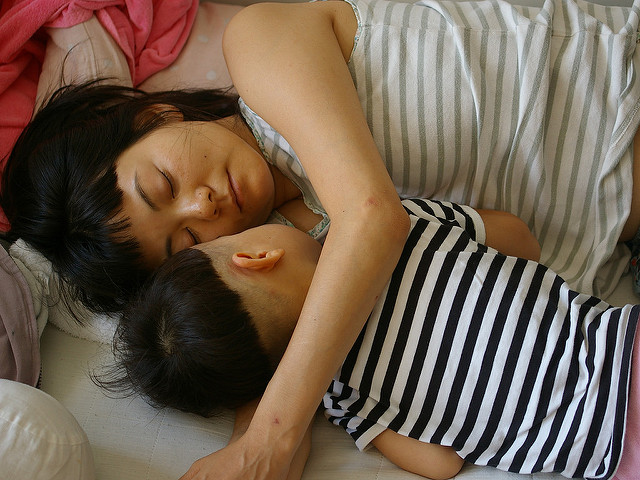
My 13-year-old son asked if he could go into the city with his friend.
I was a 13-year-old once, and way further down the rabbit hole of self-destruction than my own kid, but clearly, the answer was no. I let his friend, who lives in the city and is typically free to roam it at strange hours, stay at our house instead.
But that night—after almost 14 years of parenting, and years of teaching elementary and college-aged students—I found myself in a serious natural consequence pickle. It rattled my default need to “save,” and forced me to sit tight through thoughts of impending death—all because, I didn’t “rescue” my kid from his own behavior.
An hour and a half before dark, my son and his friend went for a bike ride. Twenty minutes before dark, I called him to tell him to be home by dark.
“Okay,” he said.
A half hour after he was supposed to be home, after not answering his phone, he called me and said his friend’s bike chain broke and they were in the city trying to get someone to fix it, and then get a ride home. My worry quickly turned to rage. Clearly he’s one, lying, two, being shady, and three—the most simple and obvious—eight miles away at a 7-Eleven in the middle of a city that’s low on the totem pole as far as crime is concerned, in the dark of night.
Of course, the first thing I did was grab my keys and say, “Oh, you’re so dead.” Except, I really didn’t want him to die, which is exactly why I wanted to kill him for compromising his own safety.
My fear became louder than my love.
It was clear he was nervous, in a strange place, on a bike, with cars and buses around, in a rain storm, and that he was hoping a magic carpet would come save him from the situation he’d gotten himself into.
Obviously, I’d rescue him from the danger he’d put himself in. Except that when he dropped me a pin for his location, I realized it would be a half hour bike ride to get back, which told me that when I called him to tell him to be home by dark, he hadn’t moved an inch in the direction of home, and was likely actually going in the opposite direction—exactly where I told him he couldn’t go.
So here he is scared, and though of course, I could save him, I didn’t.
My partner assured me that if my son found a way to get himself in this situation, he’d be able to get himself out of it, which initially didn’t fall easy on the heart of my fear. But I knew, without a doubt, that if I didn’t let my son try, he’d never know how to untie the knots he’d tied himself up in.
Reluctantly, I put my purse and keys down. I explained to my son that he needed to ride his bike back home—not get into a stranger’s car—and then we waited like parents did in the good ol’ days, when there were no cell phones. I prayed he would walk in the door in one piece.
If he made it home safely, I knew he’d feel a sense of wholeness within himself. If he didn’t, I’d likely blame myself for the rest of my life for not “saving” him from himself.
Here’s the thing: we can’t always save people from themselves, our kids included, and the struggle is not at all easy to let play out without interference. The only way for them to know themselves, truly, is if we let them face themselves by experiencing the full circle of their decisions without splitting the circle in half and bypassing the juiciest parts—the parts where they find their way out of their own self-destructive holes. Sometimes, these parts are harsh and wet and feel really sh*tty for everyone involved.
But always, though, when they do find their way to the other side, they’ve returned to wholeness after a break in integrity.
Natural consequences are easy to implement as a teacher. You spill a drink, you clean it up. You come in from recess three minutes late, you go out three minutes later than the rest of the kids the next day. Those are all natural consequences that, when implemented in an empowering way, can help mend students. And as a teacher, they’re fairly simple to follow through with.
As parents, natural consequences aren’t always easy to decipher or implement, and often, because of the confusion and fear involved, being “saved” as a consequence actually disempowers the child instead of helping them grow.
If we look at the lives of our children as a circle, we can trust that if they took themselves to 180 degrees, they’ve done so to meet themselves on the other side of 360 degrees, with a sense of fortitude—proof that they can persevere and don’t need a savior to drive them home to wholeness. But first, we must let them face the other side that we fear they won’t be able to contend with.
It is through believing that they can and will contend, and in quieting our own fears, that we realize the sovereignty of their strength, and give them the freedom to let themselves believe they are their own saviors.
It is in waiting with love—for them to come back around, to trust the universe, to trust others on the road, to trust that they will walk through the door—that natural consequences become our greatest tools for empowerment.
We may hate giving or receiving natural consequences, and we may not enjoy watching natural consequences play out without wanting to rescue others, but these feelings all stem from our deep belief that we don’t have what it takes to save ourselves, so we project that onto the “receiver” of these consequences and try to save them from themselves.
It’s not easy to let it play out, but it is necessary.
We as parents, partners, and teachers, who are watching the process of natural consequences play out, may bite our nails bloody waiting for the ones we love to arrive safely, but it’s likely that we are the only ones feeling this fear. We assume we have to feel fear because those we love were obviously stupid enough to not feel it in the first place. But fear has no place in safety. Fear will not protect us or our children, no matter how much we call upon it.
Remember being a kid, doing the stupidest sh*t ever, and having very little fear about what you did? That was freedom.
When we remember that freedom as parents, we can trust that just like we made it this far, our children have their own cards to play, and their freedom is the thing that keeps them mentally safe. It’s a state of consciousness that doesn’t imprison them with the fear of impending death. It allows them to truly live, but we fear that if their experiences aren’t played out well, we will be the ones who have lost as we fear their deaths instead of loving their lives.
As parents, it’s important to recognize how we interfere and actually hinder the evolution of our children by coming to their rescue in times when a natural consequence may be the most appropriate and wholesome thing for them—even if it sucks for us.
Thankfully, my son walked through the door two hours after he was supposed to. The experience sucked while we were in it—his legs are sore and my adrenals are shot—but he learned that he’s capable of saving himself, from himself. And I reminded myself that not only do I not have to save him from himself, I very literally can’t.
But he showed me, upon his return, that he now knows he can.
~
~
Author: Stacy Hoch
Image: Tamaki Sono/Flickr
Editor: Nicole Cameron
Copy Editor: Leah Sugerman
Social Editor: Khara-Jade Warren








Read 4 comments and reply